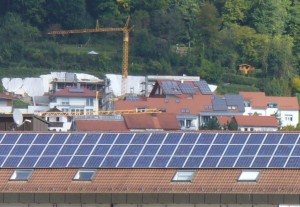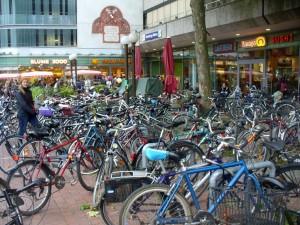The Mirror, Vol. 15, No. 710
A strong earthquake in Japan, which resulted in a powerful tsunami – and as a result damages also to four nuclear power plants had it effects also on politics in Germany. In the Federal Republic of Germany – a country with 16 states – elections were held on 27 March 2011 in the state of Baden-Württemberg [Baden-Wuerttemberg] – with almost 11 million people close in population size to Cambodia’s over 14 million, but with only about one fifth of Cambodia’s land size. The results of the elections bring the dominance of the party that led the government for 60 years to an end. And it is expected that – for the first time in Germany – a leader of the Green Party will become prime minister of a federal state. As the federal states form the Upper House of German Parliament, and the Upper House has the right to veto legislation, the change in Baden-Wuerttemberg will also have its repercussions for the federal government.
Two aspects make it worth while to look into these events not only as a German affair.
First: What happened in Japan brought changes on the other side of the globe – the events in Japan were not the only reason, but they strongly influenced the opinion of the electorate, strengthening the Green Party more than ever before. The pro-business Liberal Democratic party went down to 5.3%, from 10.7% during the last elections in 2006.
Second: The green parties are often considered to have idealistic goals which cannot find broad support in a modern, industrial society, as this would damage the economy. But Baden-Wuerttemberg is a country with a high density of industrialization: it is the seat of the Mercedes Benz company – Carl Benz produced the first automobile by putting a petrol engine on a horse chariot in 1885 in Stuttgart – and there is also the seat of the Porsche sports car company, and of Bosch, producing electric appliances for car engines and household goods, and thousands of medium and small scale industries are all over the country, in the midst of an agricultural and forested landscape. The capital city of Baden-Wuertemberg, Stuttgart, contains also the largest wine producing area of any German town or village. Agriculture and industry go together, making Baden-Wuerttemberg one of the richest states in Germany.
This is the context where the Green Party’s program was successful at the elections. The following is a translation from the website of Winfried Kretschmann, who may become the first prime minister, member of the Green Party, of any of the federal states in Germany. He is 62 years old, a former high school teacher, a co-founder of the regional Green Party chapter in 1979; in 1980 he was elected into the regional parliament, and was out and in repeatedly ever since. The Green Party (24.2%) together with the center-left Social Democratic Party (23.1%) plan to form a coalition government in Stuttgart, replacing the Christian Democratic Union which had led the government for 60 years. It was still the strongest single party in the present elections getting 39.0% of the votes – though 5.2% less than in the previous elections.
A Program for a new Baden-Württemberg
The time is ripe for a change of policy. We want to make this possible together with the women and men who are our citizens: a Baden-Wuerttemberg that is ecologically sound, with social concern, fair, open, and outward looking.
Green economic power
That means resource-efficient production, promotion of technologies concerned for the climate and the environment, and strong measures for the conservation of nature. We want to modernize our economy ecologically, so that our companies will continue to be among the top players on the world market. The future of the automobile industry depends on sustainable mobility. Local crafts and small-and-medium scale industries play a central role in the transition to the use of renewable energy. Many companies started already on the way towards these growth sectors of the economy. Green politics supports them.
New jobs and decent work
Those who cast their ballots for the Greens chose new jobs for today and for tomorrow. With a Green New Deal, we create jobs in engineering, in environmental and energy technologies, in the information technology industry, in child care, health care, and nursing home services. We want to set minimum wages and lower social security fees for low wage earners.
The best educational chances for all
To enable all children to get ahead, we want to strengthen individual attention in education, good full-day-attendance schools, and integrated community schools where people want to see them created. Educational reform starting at the local level can create a new culture of education – and the school remains concerned with its local environment. We will abolish tuition fees that work against social integration, and we will improve the conditions for the educational system.
Support for early childhood education
Kindergartens, day-care centers, and other child care facilities should be made available all over Baden-Wuerttemberg – providing good education from the beginning, and the best possible chances for all children. Fathers and mothers need to have confidence that they can find good child care close by, so that they have the opportunity to chose and be at easy when they go to work.
Moving ahead together
[Bakground: There is a high number of persons with a migrant background in Baden-Wuerttemberg. While the average percentage in Germany is 19%, in Baden-Wuerttemberg it is 25%, and 23% of them come from Turkey or have Turkish parents or grandparents. – Figures from 2007] Whether the men and women living in Württemberg were born here in our provinces in the highlands, or in Turkish Anatolia – we need the contribution of all and we want to be strong together. Everybody shall have the possibility be determine how they live. When there are problems, the society has to help: when entering into employment, when getting out of unemployment, when assisting parents who need care, and when starting as a young family. We want a develop a health care network close to everybody’s home, in cities and in the countryside, for the old and for the young.
Discussing together and deciding together
Let us dare to practice more democracy and a new style of politics! We want to make politics more transparent, facilitate to hold referendums, to involve all women and men – the citizens – directly. So that it finally becomes possible that everybody can participate in decisions about major projects, also about controversial ones.
We need mobility in the country: But we say No to “Stuttgart 21”
[Background: “Stuttgart 21” is among the largest urban development project in Europe, promoted since 1988 at a cost of originally US$3.3 billion, risen so far to an estimated US$5.5 billion, to transform the Stuttgart railway terminus station to an underground through station. A recent public opinion poll found that 58% of Baden-Wuerttemburg’s residents opposed the plan, as “the citizens weren’t involved in such a massive project” to change the layout of the city of Stuttgart.] The alternative “Terminus Station 21” costs less and provides more. But the citizens should have the option to decide: by a referendum. We want to develop better bus and rail travel in the country, moving more freight to railways, away from the roads and trucks. The Rhine Valley railway has to be developed, considering the needs of the people who live there, and it has to be done in an environmentally friendly way. For this project of a wider interest we must not waste billions for one single meaningless prestige mega-project. [A 30 March 2011 press report claims that the project was suspended, in response to the election results.]
Eating what we produce
For our small-scale farms based agriculture, organic food production offers the best economic perspectives. Organic agriculture treats nature with care and maintain the culture of our landscape. A growing number of restaurants started to offer meals according to the seasons of the year, and according to local traditions – bringing agriculture, conservation of nature, and tourism together. We will create a Baden-Wuerttemberg which is 100 percent free from genetically manipulated plants.
New energy instead of nuclear energy
[Background: The German coalition government of Social Democrats and Greens achieved a “Nuclear Consensus” in 2000 to gradually phase out the production of nuclear energy, which became law in 2002. There were detailed agreements, basically saying that no nuclear plant should stay in operation more than 32 years. After the 2009 elections, the new government entered into negotiations with the nuclear energy industry and decided in September 2010 to extend the operational period of nuclear plants up to 50 years. This agreement was reached secretly – but then the Federal Minister for the Environment stated publicly that he and other members of his ministry had been kept excluded from these new proceedings. After the accidents in Fukushima in Japan, the German government decided to re-check the security of all German nuclear reactors, and to temporarily suspend the operation of 7 reactors which had been built before 1980 for three months. These reactors were to be decomissioned according to the 2000 consensus plans, which later had been overturned suddenly in 2010. Obviously the electorate in Baden-Wuerttemberg was not impressed by this repeated back-and-forth manoevers.] To extend the operational period of nuclear power plants is the wrong way. Instead of accumulating mountains of nuclear waste, we will build on three energy principles: saving energy, increasing the efficiency of the use of energy, and renewable energy. By 2050 we want to achieve 100 percent clean energy for Baden-Württemberg, generated from hydro-power, wind, and the sun. This is good for the climate and it secures the necessary power supply. Let us make Baden-Württemberg to be a frontrunner in green technologies!
Defend our freedoms
Every person should be able to develop in a cosmopolitan and tolerant society – enjoying safety, freedom, and living without fear. We stand for strong civil rights and against developing a conservative system of surveillances nurtured by fantasies – including on the Internet. We do not accept discrimination because of one’s origin, gender, religion, age, disability, or sexual orientation.
Sound finances are necessary
We owe it to our children and grandchildren to work with sustainable budgets. Even in prosperous times the former governments led by the Christian Democratic Union operated by borrowing money which has to be paid back later. The Greens stand for a sound fiscal policy. The government of the state of Baden-Wuerttemberg needs to make sure that cities and smaller communities maintain their financial viability. But also the federal government has to act: Those who are strong should again carry a fair share of the burden of taxes.
Negatiations towards forming a coalition government are scheduled for Thursday, 31 March 2011, with 8 persons from each side delegated; 7 of the 16 are women; one has a foreign father.
It will be interesting to see the developments to come: trying to start a new type of politics – for the environment and for democracy.
Norbert KLEIN
Have a look at the last editorial – you can access it directly from the main page of the Mirror.
And please recommend The Mirror also to your colleagues and friends.




Recent Comments